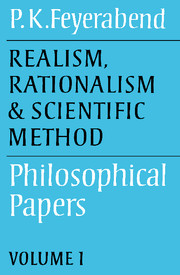Book contents
- Frontmatter
- Contents
- Introduction to volumes 1 and 2
- PART I ON THE INTERPRETATION OF SCIENTIFIC THEORIES
- 1 Introduction: scientific realism and philosophical realism
- 2 An attempt at a realistic interpretation of experience
- 3 On the interpretation of scientific theories
- 4 Explanation, reduction and empiricism
- 5 On the ‘meaning’ of scientific terms
- 6 Reply to criticism
- 7 Science without experience
- PART 2 APPLICATIONS AND CRITICISMS
- Sources
- Name index
- Subject index
3 - On the interpretation of scientific theories
Published online by Cambridge University Press: 05 June 2012
- Frontmatter
- Contents
- Introduction to volumes 1 and 2
- PART I ON THE INTERPRETATION OF SCIENTIFIC THEORIES
- 1 Introduction: scientific realism and philosophical realism
- 2 An attempt at a realistic interpretation of experience
- 3 On the interpretation of scientific theories
- 4 Explanation, reduction and empiricism
- 5 On the ‘meaning’ of scientific terms
- 6 Reply to criticism
- 7 Science without experience
- PART 2 APPLICATIONS AND CRITICISMS
- Sources
- Name index
- Subject index
Summary
1. According to positivism the interpretation of scientific theories is a function of either experience, or of some observational language. There are various views about the nature of this function and we may therefore distinguish a great many varieties of positivism: (a) theoretical terms are explicitly definable on the basis of observational terms; (b) theoretical terms are extensionally reducible to observational terms; (c) theoretical terms are intensionally reducible to observational terms; (d) theoretical terms are implicitly definable with the help of interpretative systems which either may, or may not, contain probability statements; and so on. In the present paper I shall discuss two objections which may be raised against all these varieties. Indeed, it seems to me that the difficulties of positivism as revealed by these objections cannot be overcome by inventing a new and ingenious connection between theoretical terms and observational terms, but only by altogether dropping the idea that the meaning of theoretical terms depends upon such a connection.
2. My first objection against positivism is that it implies that statements describing causally independent situations may yet be semantically dependent. In order to understand this objection consider the attempt to explicate statements about material objects in terms of what is seen, heard, felt, etc. by observers of a certain kind. It is well known that what is seen, heard, or felt by observers depends upon the object as well as upon the physiological status of the observers themselves.
- Type
- Chapter
- Information
- Realism, Rationalism and Scientific MethodPhilosophical Papers, pp. 37 - 43Publisher: Cambridge University PressPrint publication year: 1981
- 5
- Cited by



